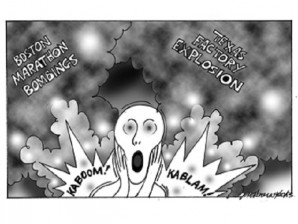This has reference to Ramon Tulfo’s column titled “Blowing the lid off oil smuggling” (Metro, Inquirer, 4/4/13).
Tulfo accuses Pilipinas Shell Petroleum Corp. (Shell) of being “the No. 1 smuggler of fuel products in the country, based on records at the Bureau of Customs (BOC)…” and that “Shell owes the government P7.348 billion, representing excise taxes and value added taxes.”
Tulfo also claims that Shell declared its petroleum products as catalytic-cracked gasoline or CCG, which is not subject to excise taxes. Indeed, this issue is being litigated before the Court of Tax Appeals (CTA). Had Tulfo conducted basic due diligence on the matter, he would have discovered that on Nov. 12, 2012, the CTA specifically stated that the government cannot collect from Shell the purported deficiency taxes (CTA Case No. 8004).
By way of background, from 2004 to 2009, Pilipinas Shell imported varying amounts of CCG and light catalytic-cracked gasoline (LCCG). These are blending components used in the refining process. In 2009, the Customs district collector at the Port of Batangas demanded P7.348 billion as payment for the total amount for Shell’s CCG and LCCG importations. The district collector alleged that CCG and LCCG were “unleaded premium gasoline” or finished gasoline products subject to excise taxes.
Shell contested the demand as there was no basis to classify CCG and LCCG as finished products. These were blending components and intermediate products used in the refining process. More importantly, Shell had paid all excise taxes due on the finished grade products that had CCG and LCCG in them.
Evidently, Tulfo’s misappreciation of the facts of this case led to his erroneous and baseless conclusion that Pilipinas Shell is engaged in technical smuggling due to misdeclared goods, thus, unduly misleading the public at the expense of Shell. It must be emphasized that Shell never misdeclared any CCG/LCCG importation. Their nature as raw materials—and therefore nontaxability at the point of importation—has always been clear in rulings of the Bureau of Internal Revenue on the matter, supported by findings and recommendations of the Department of Energy.
According to the CTA’s Nov. 12 resolution, Shell’s reliance on the previous positions of the government agencies in charge cannot be taken against Shell now. Hence, the CTA restrained the BOC from collecting the alleged unpaid excise taxes and VAT on Shell’s CCG/LCCG for the relevant periods in 2004 to 2009.
At present, motions for reconsideration are still pending with the CTA. Tulfo should have examined the records and studied the case thoroughly before unnecessarily putting our company in a bad light. This way, he would have also assisted the public in understanding the issue on oil smuggling.
—ROBERTO S. KANAPI
vice president for communications and government relations
Pilipinas Shell Petroleum Corp.,
Shell House, 156 Valero St., Salcedo Village, Makati City


